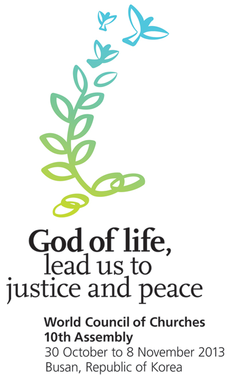Religion, Power, Politics: A conversation with Konrad Raiser
01 November 2013
*By J. Ayana McCalman
On 1 November, in the exhibition hall at the World Council of Churches (WCC) 10th Assembly in Busan, Republic of Korea, former general secretary of the WCC Rev. Dr Konrad Raiser discussed his book Religion, Power, Politics. Raiser is a theologian from Germany and author of many works in the area of political ethics and public theology, including For a Culture of Life: Transforming Globalization and Violence.
The relationship between religion and politics has become more problematic and conflicted, both locally and globally. Raiser raises the crucial question of power and the possibility of a new role for religions. In conversation with assembly participants, Raiser addressed the major themes in his book, including: the role of religion and politics in conflict; the debate about religion in the public sphere; religion and politics in Islam. Stephen Brown, who translated the book from German to English, facilitated the conversation and book signing.
Raiser was asked what prompted him to write the book. He said “in my experience in my final years as general secretary of the WCC, I began to realize that we were confronted with the manifestation of power based on religious claims and that our international political analysis had successfully eliminated religion from the political order.”
“Our adaption of the separation of church and state and the idea that religion had little or nothing to do with the political world made me see the need to develop a new approach between religion and politics.” This view is informed by the role that religion plays to articulate the identity of a community. He sees it as a basic marker of many communities. Raiser added, “Religion and culture in most places of the world cannot be separated from public life. It is a critical part of culture.”
Inter-religious dialogue
Speaking on the question of inter-religious dialogue, Raiser said that inter-religious dialogue is one of the key issues and challenges for ecumenism in the 21st century. He added that it must become one of the central tasks of the ecumenical world.
He also referred to the work begun by the WCC in this area with the publication of the landmark document Christian Witness in a Multi-Religious World in June 2011. The WCC co-produced this guide together with the Pontifical Council for Inter-religious Dialogue of the Roman Catholic Church and the World Evangelical Alliance following five years of joint work. Speaking further on the dialogue between Christianity and Islam, Raiser said that Christians ought to provide “accompaniment, support and encourage debate in the Muslim world rather than stigmatize with the catchword of ‘fundamentalism’ ”.
His book Religion, Power, Politics was published in 2013 by WCC Publications, which is hosting a series of book events at the WCC assembly including books by Christian artist He Qi and Canadian musician Andrew Donaldson.
*J. Ayana McCalman is a lawyer and a missionary for the Council for World Mission (CWM). She works for the United Congregational Church of Southern Africa as communications and justice advocacy officer.
Official website of the WCC 10th Assembly
High resolution photos available via photos.oikoumene.org





